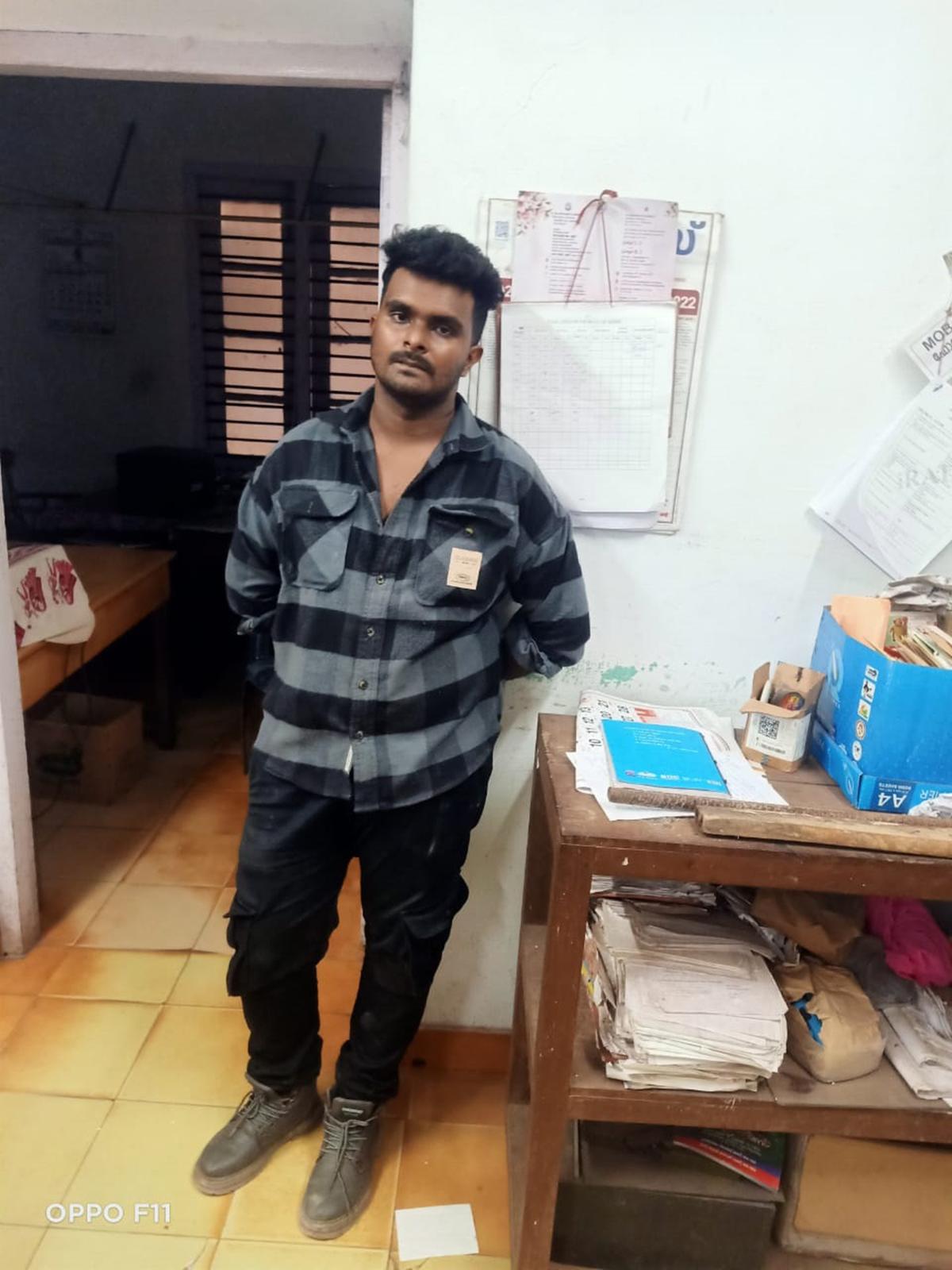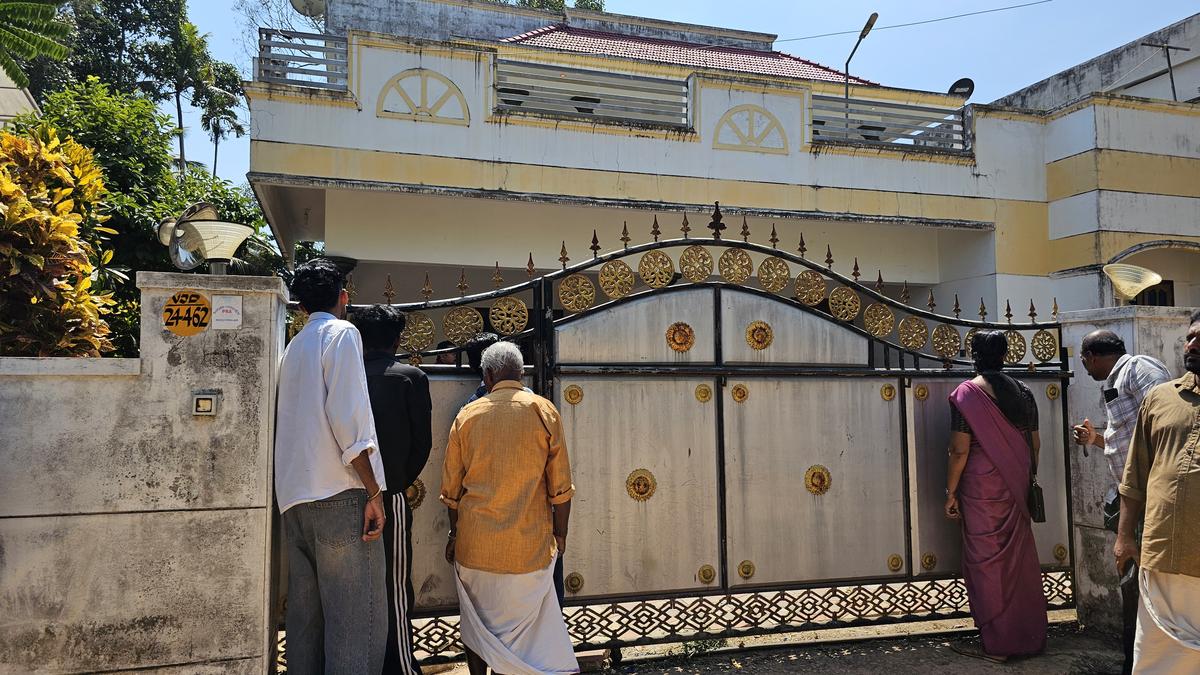Trigger warning: The following article has references to suicide and murder. Please avoid reading if you feel distressed by the potentially disturbing subjects.
Around 6.15 p.m. on February 24, 23-year-old A.R. Affan casually walked into the Venjaramoodu police station on the outskirts of Kerala’s capital, Thiruvananthapuram. Without a hint of distress, he told the officer manning the front desk, “I have come after killing six people at Perumala, Pullampara, and Pangode.”
At first, the officer thought the youth could be of unsound mind, but what followed would turn the evening into a blood-curdling revelation that would haunt the State for days.
Officers promptly took Affan into custody and grilled him further, only to hear him reel out the same chilling information. Immediately, a police team was sent to his home at Perumala based on the details he provided. As the police attempted to break the lock, curious onlookers gathered.
A.M. Nasarudeen, a retired Sub-inspector who resides across the street, recalls the macabre scenes: “We entered the house through the backdoor as we could not open the door of the house. We were hit by a scene of horror inside the house. Affan’s 13-year-old brother, Ahsan, was lying face down, dead in the living room.”
The dreadful discovery didn’t end there. In a bedroom of the house, the police found Affan’s 55-year-old mother, A. Shemeena, alias Shemi, alive but severely injured and unable to move. The police quickly summoned ambulances to shift both to a nearby hospital.
The police inspecting the crime scene at Perumala, near Venjaramoodu, a suburb in Thiruvananthapuram, where 23-year-old Affan allegedly murdered his brother and girlfriend, and severely injured his mother.
| Photo Credit:
Sarath Babu George
As the police team continued their search, the smell of cooking gas filled the house from an LPG cylinder that had been left open. The policemen were quick to close its valve to avoid a fire accident. While the neighbours claimed there was no one else in the house, the police dashed upstairs to stumble upon a grotesque sight — Affan’s 23-year-old girlfriend Farsana’s lifeless body was found in a sitting position in a chair, her face mutilated beyond recognition. Suggestive of a possible struggle , Ahsan’s notebooks lay scattered in the courtyard of the house.
The situation grew more disturbing when the police, following Affan’s lead, visited the home of his uncle, Latheef, located about eight km away. Inside, they found the 63-year-old retired CRPF officer dead on a sofa, while his wife, Shahida, 57, was found lying in a pool of blood in the kitchen.
As if this weren’t horrific enough, 88-year-old Salma Beevi, Affan’s grandmother, was also discovered dead at Pangode around 15 km away. Initially thought to be an accidental fall, it soon became clear that she too had fallen victim to Affan’s killing spree.
The violence was staggering.
Latheef had suffered over 20 blows to the head, while Shemeena needed 13 stitches on the back of her skull and had both her cheekbones fractured. The brutality of the attacks left the entire police team shaken.
Shortly after the confession, Affan admitted to having consumed rat poison before arriving at the police station. He was immediately hospitalised, but the investigation into the murders continued, though many questions remained unanswered.
Later, the police recovered a hammer from Affan’s house, which they believed was used to commit the murders. However, there was no evidence suggesting that anyone helped carry out the killings.

A.R. Affan, who allegedly committed the murders, at the Venjaramoodu police station.
| Photo Credit:
Special Arrangement
K.S. Sudarsan, District Police Chief (Thiruvananthapuram Rural), who’s overseeing the investigation, feels that the murders might have taken place over six hours. An officer privy to the investigation feels that the murders might have begun around 11 a.m. when Ahsan, a ninth-grader, had left for school to appear for an examination.
Affan is suspected to have first attacked his mother. After leaving her for dead, he purchased a hammer, backpack, and rat poison. Around 1 p.m., he might have allegedly murdered his grandmother after she reportedly refused to part with her gold necklace to pawn.
He was later found to have pawned his grandmother’s jewellery for about ₹70,000, part of which is believed to have been used to repay a loan. Soon after, he is believed to have received a call from Latheef, enquiring about Shemeena. The uncle and his wife would soon become Affan’s next victims.
Returning home, Affan found his mother regaining consciousness and, in a violent fit, purportedly struck her with the hammer again and left the house to drink at a bar.
Around 3 p.m., Affan learnt that Ahsan had returned from school and found the house gate locked. He then called in an autorickshaw driver, Sreejith, who is known to the family, to take Ahsan to a restaurant. He then called Farsana instructing her to come to his house. CCTV footage showed Farsana leaving her house at Mookkannoor, near Venjaramoodu, at 3.31 p.m., confirming the sequence of the events that unfolded.
He is then believed to have taken Farsana to his house, where he kills her, shortly before his brother’s return. Ahsan became his final victim when he arrived home with his favourite ‘kuzhimanthi’ (a popular Yemeni rice and meat dish). Afterwards, Affan consumed liquor laced with rat poison, showered to wash away the bloodstains, and called Sreejith, asking for a ride to the police station, a police officer, reconstructing the events on the fateful day, says.
The driver did not find anything amiss in his behaviour. “He claimed his two-month-old motorcycle had developed a snag and he needed a spare part from a shop near the police station. I suggested a service centre, but he insisted on going to the shop. He spoke casually and used his smartphone, conveying a sense of normalcy,” Sreejith recalls.
The brutal murders have left the local community in a state of shock, with those who knew Affan struggling to comprehend the violence. Abhinav Satheesh, who was Affan’s junior at Government Higher Secondary School, Koduvazhannoor, recalls him as an affable fellow. “We used to travel together to and from the school. Affan was always approachable,” he says.
Suhara Salim, a member of the Vamanapuram block panchayat, remembers how Affan had been protective of his younger brother. “My daughter used to offer classes to Ahsan a few years ago. It was Affan who dropped Ahsan at my house and later picked him up. During our brief conversation, Affan came across as a genial person,” she says.
Investigators believe that financial distress was a possible motive for the killings. The family had struggled for years, reportedly burdened by a debt of around ₹65 lakh after a business failure in Saudi Arabia, where Affan’s father, Abdul Raheem Hassan Kunju, had worked. A vehicle upholstery and accessories store, which he used to run in Riyadh, had run into rough weather following the introduction of Nitaqat law (the Saudi Arabia government policy that sets quotas for hiring Saudi nationals in private companies to boost local employment) and the COVID-19-induced downturn.
Suhara reminisces Shemeena confiding in her about the family’s financial troubles, and they had even mortgaged their house in the hope of getting back on their feet. “They also hoped to claim a chit from the Kerala State Financial Enterprises, but were unable to provide surety to obtain the money,” she says.
Although the family’s kin have largely supported them over the trying times, their patience could have worn thin of late. “Affan could have probably felt that his family was being gradually isolated by the others, particularly Latheef who is known to have been an influential figure in Abdul Raheem’s household,” an investigator suggests.
The accused reportedly told the police that the family had considered a mass suicide “with no respite to their despair”. This could have led Affan to murder his mother, brother, and Farsana, even while the reasons behind the attack on Latheef and Shahida remain hazy. He felt his dear ones would not be able to cope without him.
G. Mohan Roy, Professor and Head of the Department of Psychiatry, Government Medical College Hospital, Kollam, believes it is a case of murder-suicide pact, where Affan, possibly acted as the dominant personality and decided the fate of his family members.
For Hassan Kunju, the tragedy is a nightmare. Separated from his family for seven years, he watched the funeral of his loved ones on television. He was unable to perform the funeral rites of his dear ones as a travel ban imposed due to the expiry of his residence permit (iqama) held him back in Saudi Arabia.
Nass Vakkom, a social activist based in Saudi Arabia, points out that Hassan Kunju’s residence permit expired nearly three years ago. “He now faces two options – seek legal assistance from the Indian embassy or pay the fine for the expired permit, find a new sponsor, and renew the permit. However, this process will take at least two weeks. Efforts are being made to expedite his return home,” he explains.
The Venjaramoodu murders are the latest in a series of familicides that have shocked Kerala in recent years. The murders of six persons over 14 years at Koodathayi, near Kozhikode, allegedly by lacing their food with poison, grabbed headlines in 2019. The bloody memories of the Nanthancode murders, in which four family members were killed eight years ago, still haunt residents of the State capital.
Dr. Roy, who had evaluated the mental health of Cadell Jeansen Raja, the accused in the Nanthancode case, flags the gaps in community support systems as a key factor in such tragedies.
“Kerala is known for its strong network of voluntary workers and social activists working at the grassroots level. These support systems have helped cushion families in distress. However, a growing social disconnect is now threatening to undo these efforts,” he feels.
He emphasises the role of residents’ associations in keeping a watchful eye on neighbourhoods and highlights the importance of teaching social skills to children from an early age. “It is crucial to instil a sense of community and empathy in youth to help prevent such tragic events,” he says.
While financial distress and strained family dynamics appear to have played a role in the horrific murders, the crime raises deeper questions about mental health and community support. As Kerala grapples with the aftermath, the tragedy serves as a stark reminder of the importance of stronger community ties.
(Suicide prevention helpline: DISHA – 1056, 0471-2552056)
Published – February 27, 2025 08:35 pm IST
